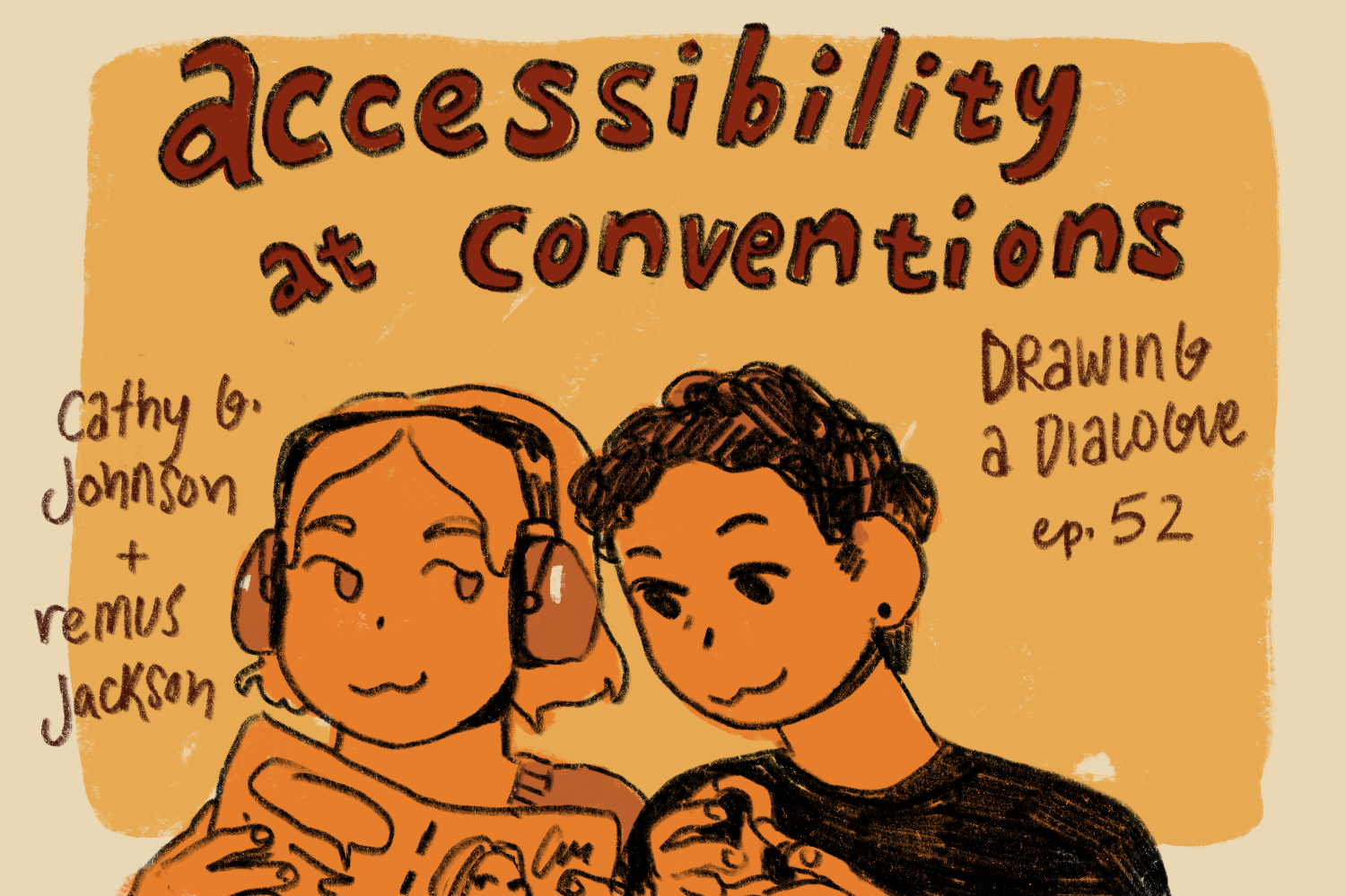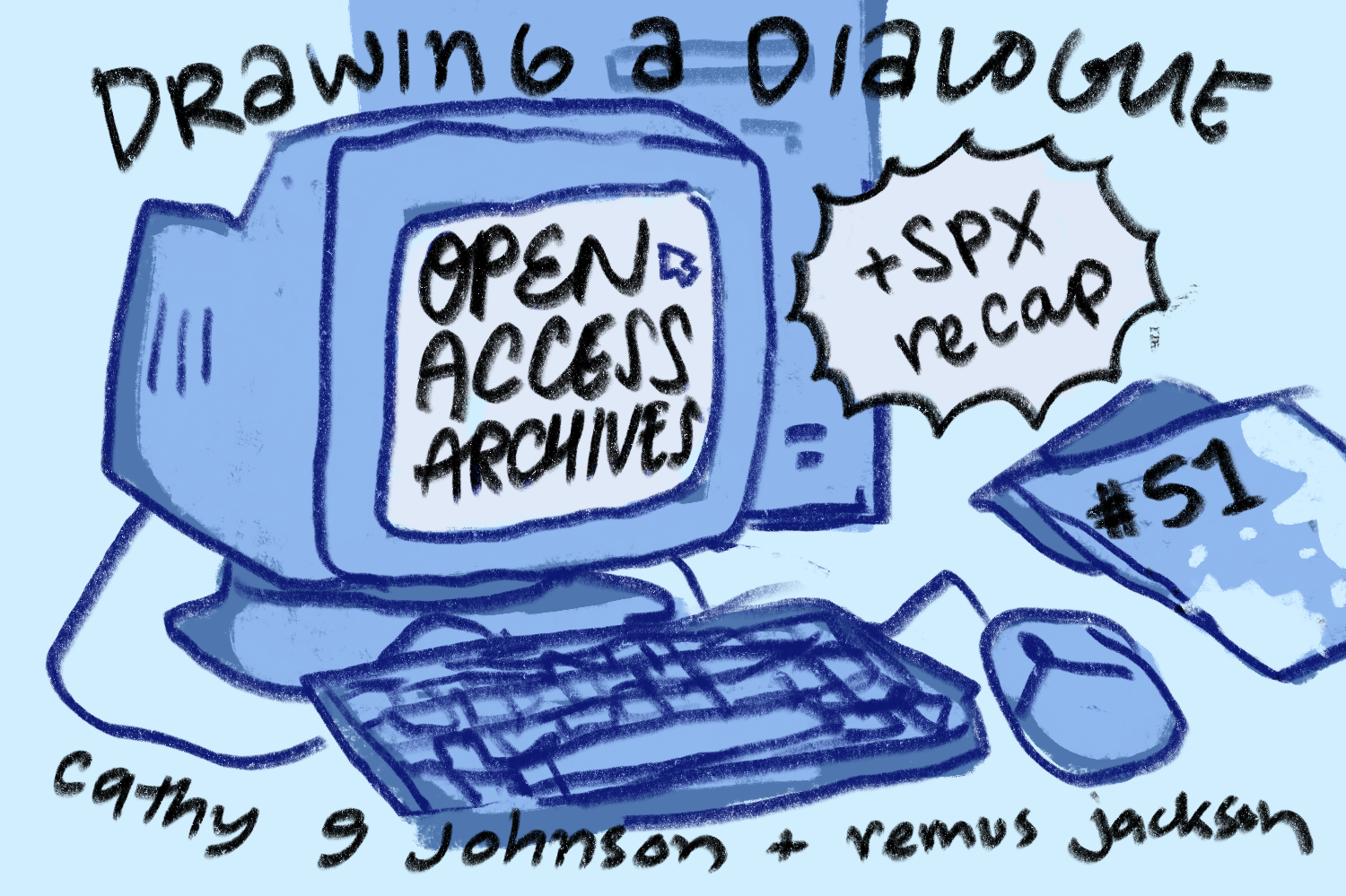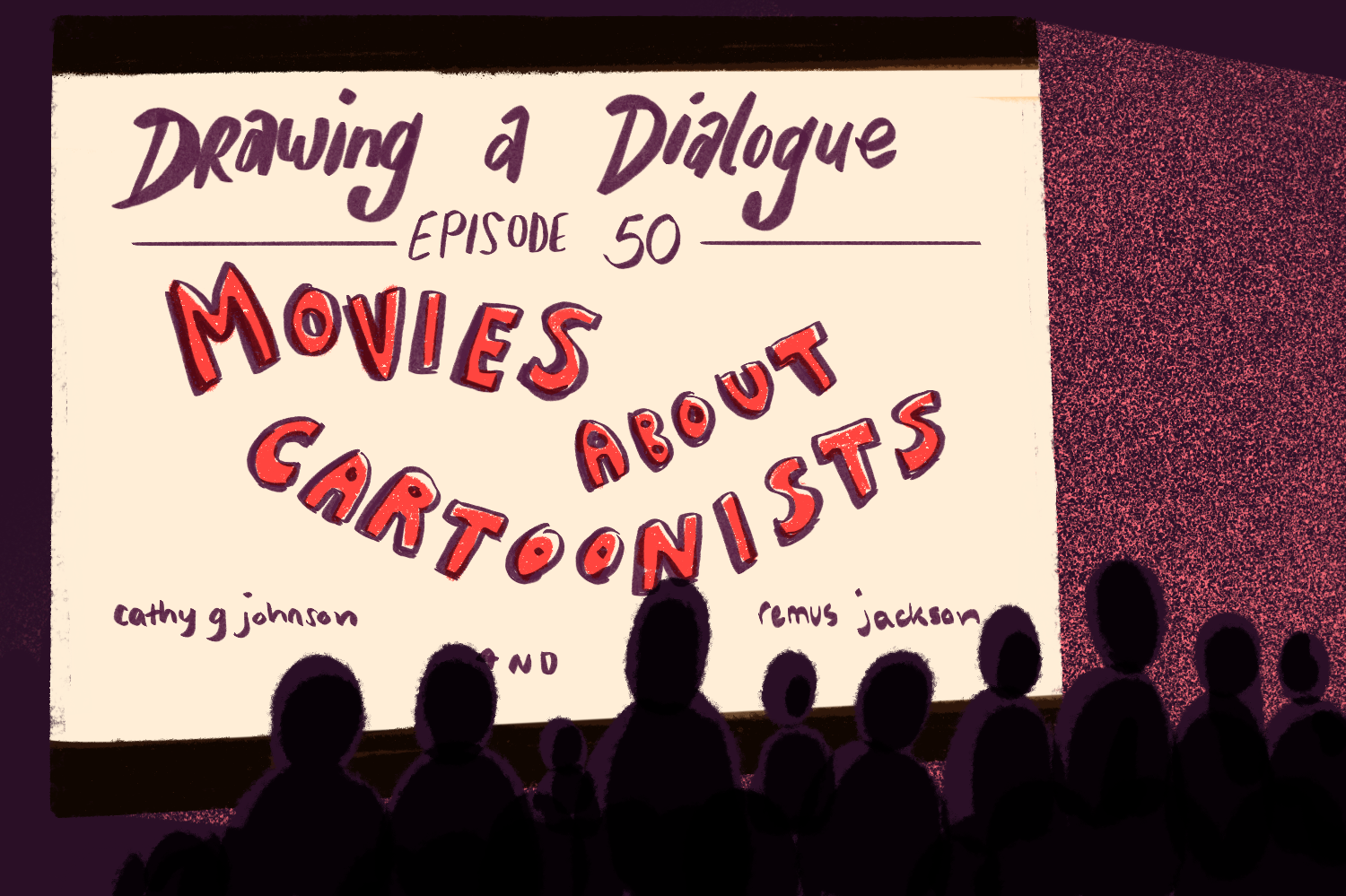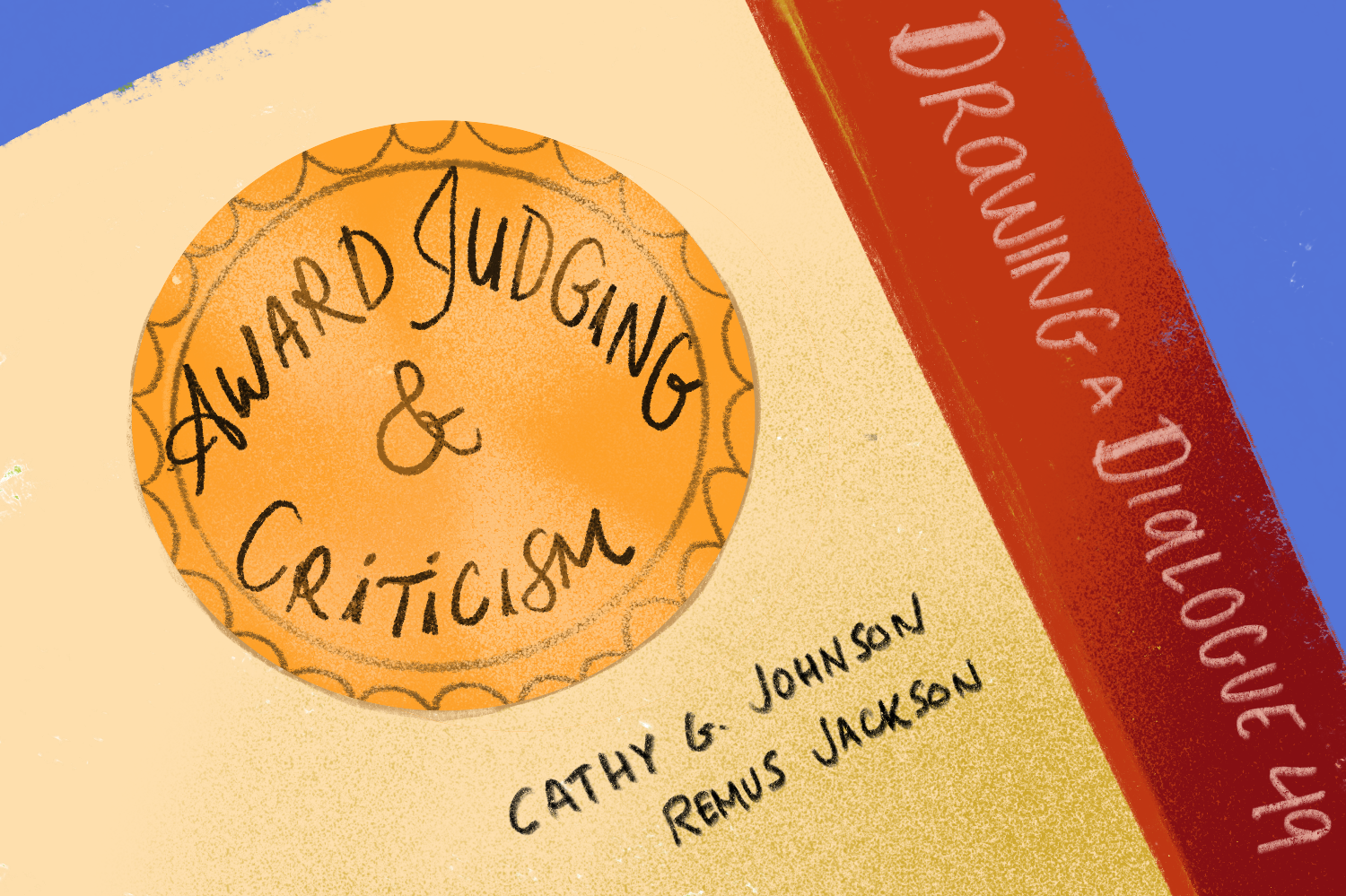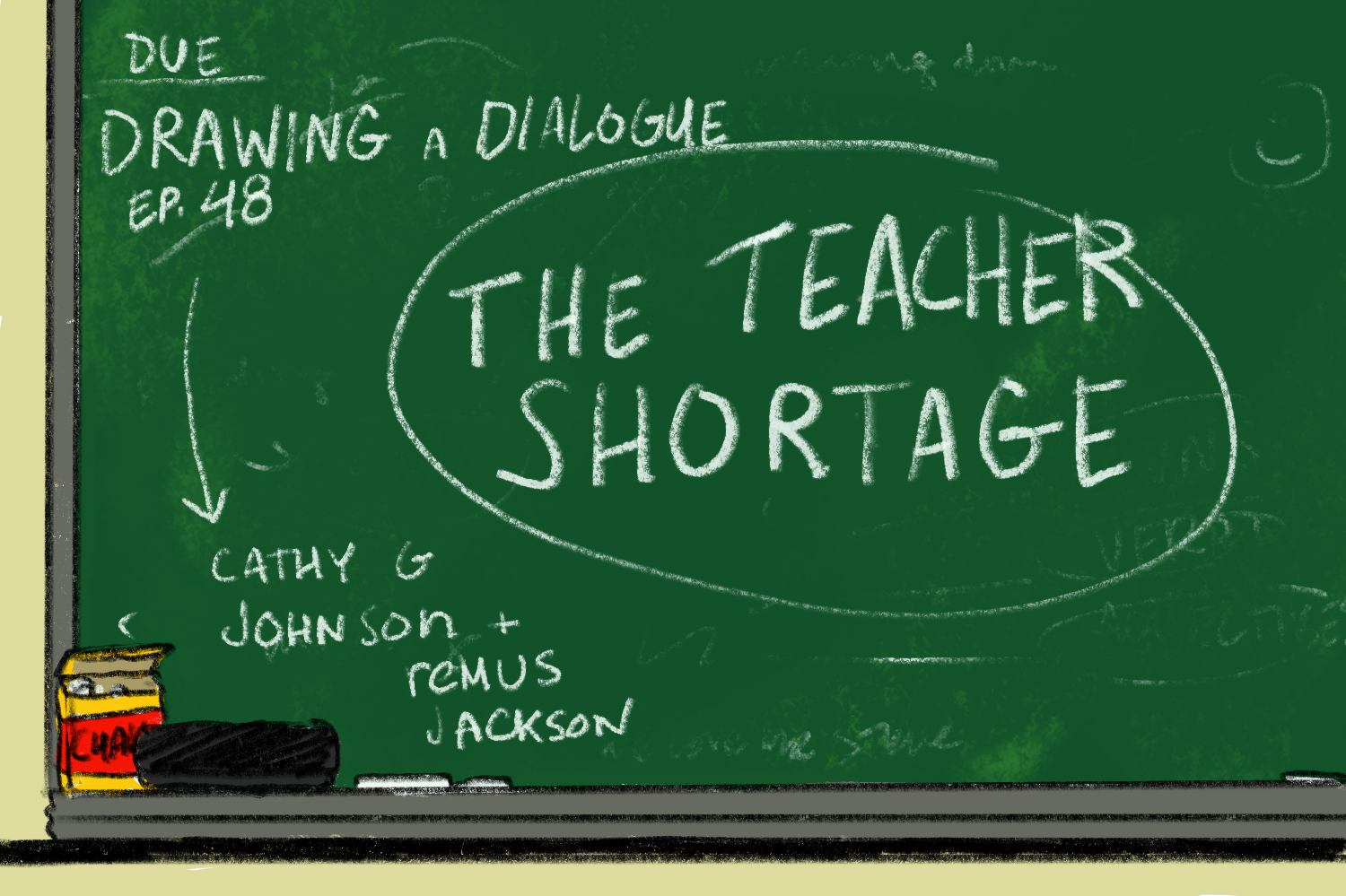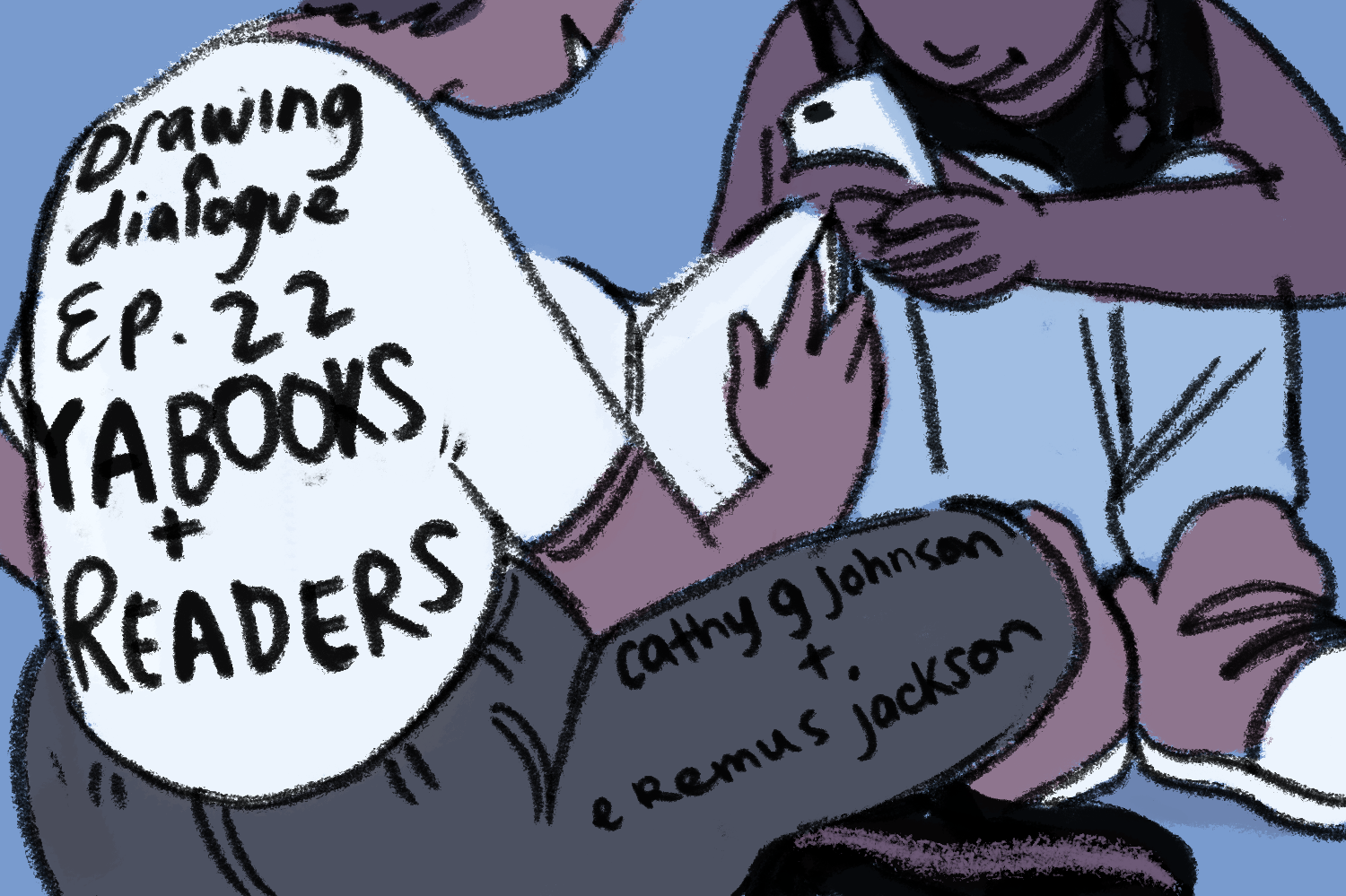Podcast
Drawing a Dialogue is a podcast discussing comics in historical + educational contexts by Cathy G. Johnson + e jackson.
Drawing a Dialogue
Drawing a Dialogue is a podcast discussing comics in historical, theoretical and educational contexts, co-hosted by Cathy G. Johnson and remus jackson.

Artwork by remus jackson.
In each episode of Drawing a Dialogue, Cathy + remus research a topic that expands our understanding of comics. This podcast is scholarship-driven and student-centered, discussing comics as an artistic medium and educational tool. Citation is available for every episode of DaD to encourage listeners to research and explore themselves.
New episodes on the first Friday of every month!
Please email us to add to our discussions, we may include you in our Letters to the Editor segment!
Email: drawingadialogue@gmail.com
Follow: Instagram, Bluesky, Twitter
Subscribe: Apple Podcasts, or any podcast app you may use!
Note: Drawing a Dialogue is intended for a mature audience and some episodes may not be appropriate for all ages.
All Episodes of Drawing a Dialogue:
Click through to listen + view each episode's citation.
The students speak out! Cathy interviews the Boston University Visual Narrative MFA graduating class of 2025. George, Joy, Francis, Sam and Jade share what it’s like to be a student in a comic masters program, important lessons they learned, and what future comics students should know. And most importantly…what’s Cathy actually like as a teacher??
Cathy recently spoke at the Rhode Island state house in a press conference supporting the Freedom to Read Act in Rhode Island. The legislation is meant to address book bans and censorship for libraries, schools, readers and creators. On this episode of Drawing a Dialogue, remus and Cathy discuss the bill, its history, and its future.
remus has just gotten back from their awesome fellowship with the Swann Foundation, which supports scholarly research and writing projects in the field of caricature and cartoon. remus shares their exploration the Library of Congress, where they gathered research in the SPX collection and Gale’s Archives of Sexuality and Gender. Join us!
Cathy and remus discuss their recent panel at Comic Arts Los Angeles. Cathy spoke with Silver Sprocket artists Yasmeen Abedifard, Connor B., Lonnie Garcia, and Nick Winn about why horror is a great genre to explore complicated relationships, first dates, and high school crushes in their new books.
Cathy and remus catch up about life, teaching, and art practices. remus shares where they’re at with their PhD dissertation and talks about their exciting upcoming fellowship. Cathy talks about squaring the peg of their art and education practice. Topics include being mindful of audiences, the physiognomy of Pixar characters, Kenny makes an appearance, and more! Thanks for listening!
Cathy shares all about her first year teaching in the Visual Narrative MFA program at Boston University! She talks about her new higher ed teaching experiences, how the program is structured, and personal observations of teaching K-12 vs. higher ed. A good listen for current MFA students or people considering it!
On this exciting episode of Drawing a Dissertation, remus introduces our new series where we interview trans cartoonists from the DIY scene! remus shares their PhD dissertation work, their approach to research, and drops the news of our exciting new DaD Presents project. We hope you join us!
Using Calmer Con in Massachusetts as a case study, Cathy and remus discuss accessibility at comic conventions. Cathy shares details about the event and the superhero costume workshops she taught. What is the difference between providing accommodations for disabled people, versus building something accessible from the start?
On this episode, remus tells us all about open access archives! What are they, why do they exist, and how can we use them? Also, Cathy and remus recap the Small Press Expo (SPX) 2023 and talk about their experiences with indie comic book conventions in a “post” pandemic world.
In celebration of our 50th episode and our 6th anniversary, let’s go to the movies! remus and Cathy discuss movies about cartoonists; not comic book movies, but movies where cartoonists themselves are the protagonist. Funny Pages, Chasing Amy, Monkeybone, and more!
Inspired by a recent situation, Cathy and remus talk about what it’s like being an award judge behind the scenes, the differences between censorship and criticism, and challenge future judges to reconsider what’s important.
In this episode, Cathy and remus discuss the on-going teacher shortage in the United States. We discuss various theories on why teachers to leave the profession, such as burnout, student behavior, and moral disagreement. What is the shortage, where is it happening, and why?
In this episode, Cathy shares her newly published book chapter, Comic Art Ed! Making Comics is for Everyone! She discusses the art education approach to K-12 comic book lesson development through five different pedagogical values: teamwork, ideation, literacy, self-actualization, and fun. Cartooning combines drawing and writing into its own unique learning and creating form. This chapter synthesizes the past decade of Cathy’s work helping develop the pedagogical field of making comics in the art classroom!
What is the PhD process like? In this episode, remus updates us on their PhD progress, specifically sharing how the qualifying exam goes and how dissertations are written. Cathy shares why she stopped at a master’s degree. Why get a PHD? What is it for? Let’s talk about it!
How can a drawing be transgender? Cathy and remus are joined by special guest Fi Stewart-Taylor to talk about the representation of transgender people in comics. Fi talks about what representation and inclusion is, including research into early webcomic trans representation before “the transgender tipping point.”
In this episode, remus discusses the way queer AIDS activists used art and comics as part of their activism during the the 1980s-1990s. They specifically talk about four art projects: the AIDS memorial quilt, work by activist group Gran Fury, the comics anthologies “Strip AIDS” and “Strip AIDS USA,” and David Wojnaworicz's “7 Miles A Second.”
The common definition of BL, the acronym for Boys Love, is “a genre consisting of male-male romantic fictions created by women and for women in Japan, previously known as yaoi.” But is it only women? Cathy and remus discuss the history, contemporary status, and transformative power of BL manga for queer representation, using the awesome expert panel hosted by The Japan Foundation NY as citation: “Boys' Love: The History and Transformation of BL in Asia.” Join us!
A chatty episode, remus and Cathy have a conversation catching up about life! remus shares where they are in regards to academia, new jobs and healing, and Cathy talks about finding balance. Also, are they making comics right now or what?!
In this episode, Cathy shares her graphic novels of the year! Cathy served as a judge for the LA Times Book Prize in the Graphic Novel/Comics category, and will be talking about the nominees and winner, as well as a few other favorites that didn’t make the list. Let’s talk about some good comics!
In this episode, remus shares how to do your own research! Learn best research practices, what’s up with academic publishing, and where to get your information… for free heheh.
Special guest Ross Hernandez join Cathy and remus to talk about how capitalism shapes the creation of comic books. We learn about different forms of labor, art’s relationship to capitalism, and how the comic book industry mashes these worlds together. Where are we right now, and what are our next steps forward? Capitalism is dying, and we should let it die.
In this episode, remus and Cathy introduce and discuss queer theory. remus shares the history of queer theory and how it can be used as a framework for thinking about comics and beyond!
Spurred by the recent media attention for the ban of her graphic novel The Breakaways, Cathy leads a discussion with remus on the value of sports in K-12 schools, House Bill 25 in Texas, and the rights of transgender student athletes.
In this episode, remus and Cathy discuss how ableism manifests in comics culture and shapes all our lives. Definitions of accessibility versus accommodations are shared, as well as discussion about disability justice in comics and schools.
In this episode, Cathy and remus use the work of scholar Tema Okun to look at how white supremacy culture has imbedded itself in our everyday lives, and share how together we can antidote and circumvent its characteristics with anti-racism work.
Cathy + remus are back! They talk about teaching during the pandemic, and the past, present and exciting future for Drawing a Dialogue. Thank you for your patience!
Cathy + remus share their favorite comics that influenced their own art. Cathy talks about 2000s zines + indie comics. remus talks about manga + Homestuck. Additionally, they both touch upon the stresses of being an educator during a pandemic.
Cathy + remus talk about the way propaganda has historically shaped the dominate United States way of thinking. remus discusses the propagandistic role of comics and superheroes in proliferating violent vigilanteism. Cathy discusses how history was taught with propagandistic intention, + shares ways the art classroom can illuminate historical context.
In this episode, Cathy + remus talk about police abolition, and what comics are capable (and NOT capable) of doing. Comics as an activist tool are discussed, as well as ways educators can work to eliminate police presence in schools. Solidarity forever. Black lives matter.
In this episode, Cathy + remus document the teaching + learning transition to distance learning due to the COVID-19 pandemic. Public university, private school + public school approaches are discussed based on public statements + personal impact. remus presents mutual aid pedagogy work + possibilities for disability justice, + Cathy provides updates on the Providence Public School state takeover + their pandemic response.
Cathy + remus discuss the contemporary role libraries play in the popularity of young adult graphic novels. remus discusses how libraries have changed their attitudes toward comics, moving from crusaders to advocates. Cathy talks about the new graphic memoirs Fights by Joel Christian Gill and Gender Queer by Maia Kobabe. She discusses the possibilities these books hold for educators + young adult readers, + using comics as a tool to approach difficult topics.
On this episode, Cathy + remus discuss public libraries in the United States. remus presents the history of libraries, their purpose for the public + the American Library Association (ALA). Cathy discusses the current services libraries offer the public, including family support, youth services + addressing poverty + homelessness. Cathy also introduces a new segment to Drawing a Dialogue called “Schools Are The Community,” to discuss the current state takeover of Providence Public Schools.
Continuing from last episode, Cathy + remus further their discussion of the museum by examining decolonization efforts. remus offers real case studies of what museums are currently doing to address colonial pasts. Cathy shares lesson plans that complicate the use of museums in classrooms. The two discuss what decolonizing is, can look like, what is being done, + address the problematic idea that institutions should be saved.
Cathy + remus discuss the history of the art museum + museum education. remus discusses museums as an Enlightenment era outgrowth, moving into the display of art in the museum + its purpose. Cathy talks about the history of art museum education + the underlying theories, + how museums can be used in art education today. Both hosts discuss the colonial histories + cultural responsibilities of all museums, + how we can move forward.
Cathy + remus talk about transmasculinity + gender development in children. remus discusses masculinity through two different trans memoir comics by Higu Rose + Victor Martins, placing the narratives into a new historical canon. Cathy shares the latest in transgender child development research, focusing on younger children, including statistics, books + lesson plans.
Cathy + remus talk about grading in schools + universities. What is the history of giving students grades? What is their purpose + pitfalls? Cathy + remus discuss how all grades are subjective, talk about different standards that can be used + share various approaches and methods.
Cathy + e talk about Restorative / Transformative Justice practices + how they interact with comics, schools + communities. e defines RJ/TJ, why it’s important, + discusses ways to remove policing from our communities. Cathy talks about educational uses of RJ/TJ + how schools are microcosms of our larger world.
Cathy + e talk about Young Adult (YA) books + readers! e starts out by sharing the history of the YA genre, how books began to be marketed to an adolescent audience, + who is actually reading them. Cathy then talks about young adults in classrooms, including reading habits, new technologies + how comics can be used to teach a broader understanding of literacy.
Happy May Day! Cathy + e talk about labor and comics. They begin by defining what capitalism and commodification is. e goes over the history of attempts by cartoonists to unionize, then Cathy discusses theory about why we should make art as a community. We are stronger together!
On Drawing a Dialogue’s 20th episode, Cathy + e share their personal histories as working cartoonists in academic settings. Cathy talks about her new graphic novel “The Breakaways,” and how her work as an artist + educator informed the book. e talks about their current research + scholarship practice as a University of Florida PhD student.
Cathy + e discuss GIRLS! e talks about the history of Grrrl zines, including Riot Grrrl, zine culture + canonization. Cathy discusses the history of the education of women and girls in the United States, the feminization of teaching, + the benefits of programs focused on marginalized genders, such as Girl Scouts + the Girls Rock Camp Alliance.
In this episode, Cathy + e discuss the social role of masculinity. e presents the definitions of masculinity and its feminist origins, the theories of sociologist Raewyn Connell, + moves into the theory of today. Comics discussion moves beyond the image into social relations + how production can be gendered. Cathy discusses masculinity in adolescence, the violence of it being taken to the extreme, and how art education + comics has a role in the gendered lives of students.
Cathy + e discuss how trans memoirists document their experiences, + have an in-depth analysis on the current school climate for trans students within the United States. e talks about the history of whose stories are categorized as autobiography, and how the trans memoir has evolved throughout time. Cathy talks about the current school climate for transgender and gender non-conforming students, including bathroom access, the legalities under Title IX, and “safe spaces” in schools.
In this episode, Cathy + e discuss the history of incarceration, the school-to-prison pipeline, and how prison art + writing are tools of radical resistance. e discusses the development of mass incarceration, the history of prison writing, + how imprisoned radical intellectuals resist the carceral system. They look at the ABO Comix anthology as an example of this resistance. Cathy presents the school-to-prison pipeline, how discriminatory discipline practices perpetuate the system, + the history of juvenile court.
In this episode, Cathy + e create a biography for Jackie Ormes. Born in 1911, Ormes was a cartoonist, reporter, fashion designer and community organizer during an important century of American history. Cathy + e discuss the seminal role Ormes had in the black press during a pre-civil rights movement America, notably challenging derogatory caricatures of black women of the time.
In this episode, Cathy + e explore how the multimodal experience of comics is ripe with possibilities for engaging with neurodiversity. e discusses disability theories applied to reading and creating comics. Cathy talks about the educational applications through Social-Emotional Learning.
Cathy + e discuss the history of fatphobia and how fat-negative bias was developed in North America. They talk about repercussions in the media + how it still affects us today, including how children develop their sense of self + others.
In the longest episode yet, Cathy + e present research on how racism affected the development of the visual language of cartooning. Spanning the 1700s to today, this episode explores the history of art education, caricature and how-to-draw books, and maps the history of minstrelsy in America, creating connections that informed early cartooning. In-depth research offers multiple samples of primary sources, including the art of “physiognomy,” the pseudoscience of judging character from facial features.
In this episode, Cathy + e look at the history of queer comics in the American underground and build a biography for the cartoonist + illustrator Jeffrey Catherine Jones. Queer erasure is examined while a history is looked at, researched, and built.
In this episode, Cathy + e examine the art historical idea of “the canon.” They discuss definitions of the word, the history of the practice, canonization’s criticisms, and how comics are understood within the framework.
Cathy + e take a look at censorship, banned books, and why some things are deemed appropriate for kids and some things aren’t. e looks at the history of obscenity and how societal censorship suppresses marginalized voices. Cathy examines children’s learning development in reading and art, how graphic novels get categorized, and why.
Historically, mass-produced media is monickered as “low culture,” while fine art is “high.” Where does this dichotomy come from, how are comics treated in this binary, and how can educators take advantage of it? In this episode we dissect the history of accessible media and how comics in the classroom can benefit. Live from Comic Arts Los Angeles!
Cathy + e examine the aesthetics of violence, its depictions in comics, + look at research on how media violence affects its viewers. e examines the ways comics are uniquely suited to depict traumatic memories + violent acts; Cathy talks about the ways the art classroom can address school violence.
Jumping off of the last episode, Cathy + e complicate their discussion about ‘the gaze.’ They revisit Laura Mulvey’s original ‘male gaze’ definition + its criticisms. Lesbian, black, female, transgender, imperial + medical gaze theories are discussed, which broaden the conversation + offer resistance.
In this episode, Cathy + e talk about the critical theory 'the gaze.' They recount the gaze's history, its applications in comics culture, and how the theory can be used in art education to teach students how to critically engage with their role as a viewer.
Infamously known as the author of the 1954 book Seduction of the Innocent + blamed for the demise of the Golden Age of comics, German psychiatrist Fredric Wertham is more than a censorship scapegoat. Cathy + e discuss his career as a medical psychiatrist, advocate for African American mental healthcare, + talk about the biases + legitimacies behind this controversial figure.
Using the graphic novel My Lesbian Experience with Loneliness as a jumping off point, Cathy + e talk about recent memoir comics + build a context through political performance art + social justice in art education. (This episode discusses human sexuality + uses some mature language.)
Cathy + e talk about the evolution of high culture, Clement Greenberg (that guy!), how the Arts keeps the average person at arm’s length, and how comics can combat it.
Introduction episode! Cathy + e talk about how comics have been defined throughout history, how + why comics were adopted into English classrooms, + the “reluctant reader” idea.
Drawing a Dialogue Presents:
Special episodes of Drawing a Dialogue with guest interviews.
Karen Czap is an Ignatz Award-nominated cartoonist, author of Fütchi Perf and Four Years. Their coloring work can be found in The Breakaways, Freestyle, BUNT!, and more. Czap lives and works in Providence, RI as a member of the Binch Press / Queer Archive Works studio co-op. In this interview, we talk about the comics community, publishing with friends, conventions, and of course, the X-Men.
Carta Monir is a performance artist, performer, and writer. She was a 2022 Tom of Finland Foundation artist in residence. Her work deals with her own transness, disability, and desire. She lives in Michigan. This interview is the fifth of our series supporting remus’ PhD dissertation work. Thank you for joining us! (Note: This episode is for mature audiences.)
higu rose is an illustrator, cartoonist, ethnographer, and local terror living in pittsburgh, PA. based in fiction and autobiography, higu’s work focuses on experiences of being Black, queer/trans, and a little bonkers. higu is currently working on YINZ CITY, a graphic novel series about a group of queer and trans people of color. This interview is the fourt of our exciting new series supporting remus’ PhD dissertation work. Thank you for joining us!
Seosamh aka Joe is a butch trans painter, a hypertext enthusiast, and author of dark, surreal, and intimate worlds of denim, leather, and gloss. Among other projects, he and his partner Anka are proud co-authors of the ongoing sci-fi comic, SUPERPOSE. This interview is the third of our exciting new series supporting remus’ PhD dissertation work. Thank you for joining us!
Sunmi is a cartoonist whose body of work explores emotional distances and gender deviant fantasies, within a framework of queer + Korean histories and mythologies. This interview is the second of our exciting new series supporting remus’ PhD dissertation work. Thank you for joining us!
Emma Jayne is an Ignatz and Prism Award-winning cartoonist. This interview is the first of our exciting new series supporting remus’ PhD dissertation work. Thank you for joining us!
DaD Presents, Episode 3: Art + Social Justice Collectives with Priscilla Carrion. Priscilla Carrion is a visual artist, educator + member of many group collectives + non-profits in Providence with a focus on art + social justice. Priscilla discusses her history building community within collectives, starting out as a student + moving towards volunteer, staff + board positions. We discuss local groups Ecas Theater, Sista Fire, New Urban Arts + Girls Rock! Rhode Island.
DaD Presents, Episode 2: Zine Curator + Archivist Malana Krongelb. Malana Krongelb is the librarian at the Sarah Doyle Women’s Center and the founder and curator of Brown University’s first zine collection. Started in 2016, the collection focuses on sharing and preserving zines by marginalized creators and consists of titles from 1974-2018.
DaD Presents, Episode 1: Educator Walker Mettling. Walker Mettling is the co-founder of the Providence Comics Consortium, which is a series of comics classes taught in Providence Community Libraries. They have produced over 25 books of kids' and adults' comics over the past 7 years.
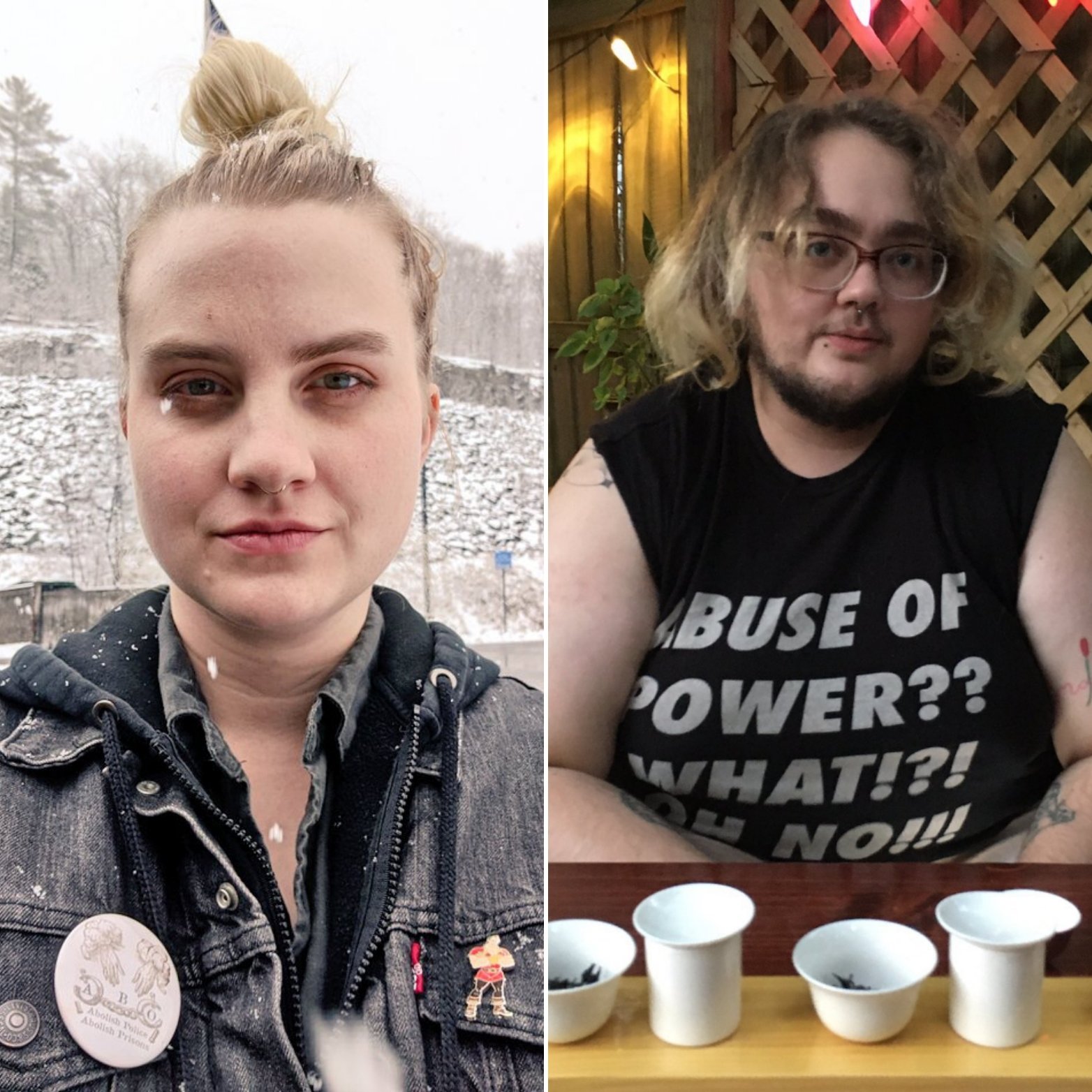
The Hosts
Drawing a Dialogue is a podcast hosted by Cathy G. Johnson and remus jackson.
Cathy G. Johnson is a published cartoonist + educator. She works with K-12 students in schools in addition to alternative educational settings. She has three graphic novels out, in addition to self-published works. She has a masters degree in art education.
remus jackson is a cartoonist + PhD student in the University of Florida’s English program. Their research focuses on trans embodiment and experience in comics/zines and museum studies. They make self-published comics.
Please note: Links may contain mature material.







